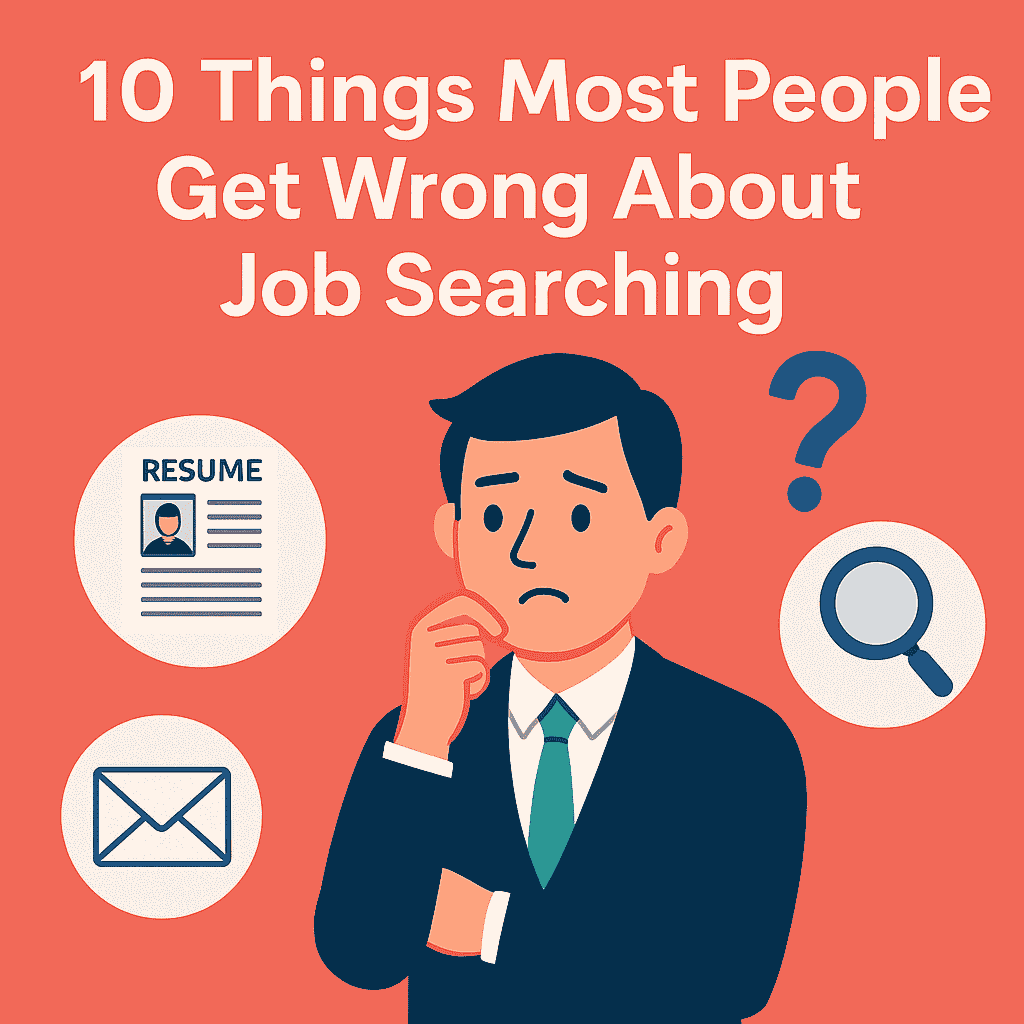What Most People Get Wrong About Job Searching
Job searching has never been more accessible — or more misunderstood. In a world filled with online job portals, AI tools, and endless career advice on social media, it’s easy to assume we know what we’re doing. But here’s the truth: most people still get the job hunt wrong.
If you’ve been applying for weeks with no response, sending out dozens of resumes, or feeling burned out — you’re not alone. Let’s break down the most common job search mistakes and learn how to do it the right way.
1. Believing That Applying to Hundreds of Jobs Will Work
The “spray and pray” approach might feel productive, but it rarely gets results. Job seekers often think the more they apply, the better their chances — but that’s a myth.
Most employers use Applicant Tracking Systems (ATS) to filter resumes. If your resume isn’t tailored with the right keywords or is too generic, it won’t even be seen by a human. Instead of mass-applying, focus on quality applications that are aligned with your strengths and customized for each role.
2. Underestimating the Power of Networkin
80% of jobs are filled through referrals, not applications. Yet most people spend all their energy on job boards and ignore their professional network.
Even if you think, “I don’t know anyone,” you probably do. Reach out on LinkedIn, reconnect with past colleagues, or join industry-specific communities. A simple conversation can lead to a hidden opportunity — or a referral that gets your foot in the door.
3. Using the Same Resume for Every Job
This one’s a classic. One-size-fits-all resumes don’t work. Every job description is different, and your resume should reflect that.
Use the exact skills and keywords from the job posting. Show results, not just responsibilities. Better yet, use AI resume tools to optimize your content for ATS. A customized resume dramatically increases your chances of landing interviews.
4. Thinking the Job Search Will Be Quick
Let’s be honest — the job search is a marathon, not a sprint. Many candidates expect results in days, but the average hiring process takes weeks, sometimes months.
This mindset shift is important. Be patient, track your applications, and stay consistent. The key is to stay active, not just hopeful.
5. Overlooking Personal Branding
Your online presence matters more than ever. Recruiters will Google you — and what they find can influence their decision.
An empty or outdated LinkedIn profile? A big red flag. Invest time in building your personal brand: update your headline, add achievements, write a short bio, and showcase your work. A strong digital presence is your second resume.
6. Ignoring the Power of Follow-Up
Here’s a big one: Most people never follow up after applying or interviewing.
A simple thank-you email or check-in can make you stand out. It shows professionalism, persistence, and genuine interest. Don’t overdo it, but don’t skip it either. Follow-ups build relationships — and that’s what hiring is all about.
7. Focusing Only on Job Titles, Not Skills
Job seekers often limit themselves by only searching for a specific title. But roles are evolving, and many companies use different titles for similar responsibilities.
Instead, focus on skills and what you enjoy doing. Explore hybrid roles or emerging industries. Job searching is not just about what you did, but about what you can do.
8. Taking Rejection Personally
Every rejection stings — especially when you’re trying hard. But here’s the truth: it’s not always about you.
Sometimes the position was closed, someone internal was hired, or your resume just didn’t match the algorithm. Rejection is not a reflection of your worth. Learn from it, tweak your strategy, and move forward stronger.
9. Forgetting to Practice for Interviews
“I’ll wing it” is not a strategy. Interviews are high-stakes conversations, and preparation is everything.
Use the STAR method, research the company, and practice your answers out loud. Record yourself if needed. The more comfortable you are, the more confident you’ll appear. Confidence can be the difference between a maybe and a yes.
10. Not Being Clear on What You Want
Finally, one of the most overlooked aspects of job searching: clarity. Without a clear goal, you’ll end up applying for roles that don’t excite you or match your strengths.
Ask yourself: What kind of role energizes me? What environment do I thrive in? What values matter to me? The more focused your search, the better your results — and the happier you’ll be in your next role.
Conclusion: Be a Smarter Job Seeker
Job searching isn’t just about sending resumes — it’s about strategy, persistence, and clarity. Most people make the same avoidable mistakes, but now you don’t have to.
Be the one who networks, personalizes, follows up, and stays clear on your goals. That’s how you find a job — not just any job, but the right one.
Want to instantly improve your resume and boost your interview chances?
Try our free AI-Powered Resume Analyzer Tool — it checks for ATS compatibility, keyword match, and formatting issues in seconds. Get personalized suggestions to make your resume stand out!
